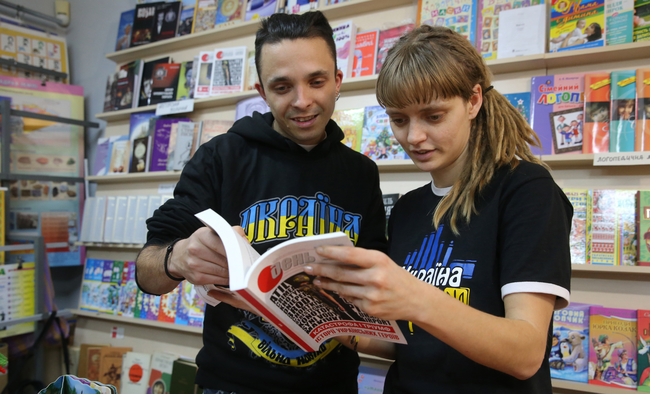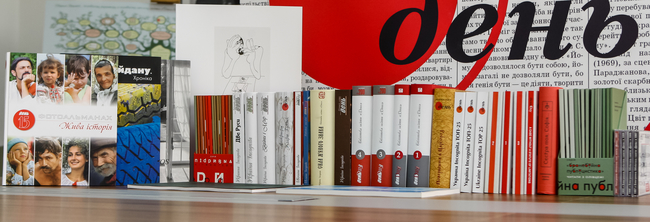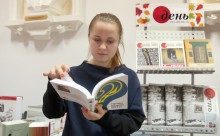The Den Library is a supplement to the Ukrainian passport. This idea our editor-in-chief expressed in the very first years of the library’s existence has been confirmed and become particularly topical in the past few years. For the Ukrainians “armed” with reconsidered historical knowledge are citizens of a totally different quality – the one needed for a constructive struggle for a new Ukraine.
Den’s book project marks its 15th anniversary in 2017. The first book was Ukraine Incognita which, incidentally, has already run into nine editions and still remains a top-selling item. Larysa Ivshyna wrote in the preface to this publication: “To restore the frame of moral references after a series of severe historical shocks, society needs a certain ‘homeopathy.’ This can be done in the best way by learning the lessons of historical memory.” The newspaper’s library has as many as 48 “lesson books,” and the aggregate print run is almost 150,000 copies. This striking result became possible because the editor-in-chief had made Den a magnet for progressive historians, philosophers, literature experts, and sociologists at the very outset. Somebody even coined the phrase that Den had formed its “party of historians.” This “party” is a powerful weapon to fight against “chaos in brains” which has also been increasingly stimulated from abroad in the last few years – by the aggressor country. The intellectual civil society has made use of this force, whereas the government, unfortunately, has not done so. Is this perhaps why we are running the risk of making again the blunders of the past centuries?
“I share the words of our philosopher Serhii Krymskyi: Ukraine is full of ideas but short of qualities. History can shape the qualities people need in their ordeals,” Ms. Ivshyna also says in the preface to Ukraine Incognita. Shaping is a long and painful process. For this reason, in spite of economic difficulties and thanks to support from socially responsible business, the Den Library shows new initiatives every year.

Photo by Ruslan KANIUKA, The Day
In 2012, when Den/The Day and its readers marked the 10th anniversary of Ukraine Incognita, a website of the same name was launched and a special postcard was issued, which bore a creative symbolic drawing by Iryna Zelenko with the caption “The first swallow that made a summer.” It is true because now, in 2017, we can name five to ten serious historical national Ukrainian resources, while there were none at all in 2002. As Ms. Ivshyna pointed out at the online conference to mark her 20 years as editor-in-chief, the Den Library’s anniversary will also be one of the newspaper’s priorities in 2017. A new joint project with the Ukrlife.TV internet channel is in the pipeline – a cycle of programs in the shape of lectures and debates on the topics of Den’s historical publications with participation of their coauthors and some devoted readers.
“WE DREAMED TO LOOK LIKE DEN”
Liudmyla NEMYRIA, general producer and journalist, Ukrlife.TV channel:
“The newspaper Den was, and I am sure will be an art studio of sorts, which attracts all kinds of people who analyze, discuss, and think over really serious subjects. It is very important. When we were establishing our channel four years ago, we dreamed of looking one day like such a newspaper as Den, which gathers various people who think, reflect, discuss, and are not afraid to be unpopular. We are very glad and proud today that this joint project is possible because we always support historical programs. Of course, we have no resources to make such beautiful history programs with various arrangements or some computer graphics. But we are happy to be able to invite wise people who can tell us of this. I am therefore grateful to Larysa Ivshyna personally and the newspaper Den for this initiative. I am sure this project will succeed.”
“KNOW YOURSELF, UKRAINIAN NATION!”
Volodymyr PANCHENKO, literature expert, coauthor of Den Library books, beginning from Ukraine Incognita:
“The Den Library is an unprecedented project. About 20 books have been published in 15 years, which are supposed to show the reader Ukraine’s history in various aspects, with endless themes and details. The strategic goal is almost according to Skovoroda: know yourself. Skovoroda addressed these words to everyone, but it is about a nation in our case. Know yourself, Ukrainian nation!
“It pleases me to recall how it all began. In the summer of 2002, when university vacations had already begun, Larysa Ivshyna invited me to the editorial office – just to chat (there were a lot more chats like this, which always resulted in some creative ideas, plans, and improvisations that, after all, produced something interesting). Among other things, I was enthusiastically speaking to the editor about Ukraine Incognita materials and suggested that it would be a good idea to publish the best of them as a book. ‘And are you prepared to take part in his work?’ Ms. Ivshyna asked me directly. Her question meant that she viewed the idea as a business proposal. ‘Yes, I am,’ I answered, still aware that I was on vacation. Then, about 10 days later, the three of us – Serhii Makhun, Ihor Siundiukov, and I – ‘dug over’ the Den files for several years and drew up the plan of a book. It was published in early September (i.e. in a few months’ time) under the same title as the rubric – Ukraine Incognita.

Photo by Ruslan KANIUKA, The Day
“The book was republished many times in the following years, which means that readers evinced a keen interest in national history. It is a gratifying fact, for it is not just about some tidbits of the past – it is about a bad need in historical memory, a necessity to enrich and actualize it.
“It often seems to me that history tends to repeat itself. So if you know the past well, you can understand the present better.
“Let me give an example about the events that occurred 100 years ago. I read an interview with ‘Comrade Shchors,’ commander of the 1st Soviet Brigade, in the Kyiv newspaper Borotba of February 12, 1919, in which he explained in no uncertain terms that a group of troops had been forming since the summer of 1918 near Kursk for an offensive on Kyiv. Soviet Russia was arming Shchors’s Ukrainian guerrillas, making a regular army out of them.”
“Shchors boasted: ‘We expect the arrival of a big Soviet Army reserve one of these days and will be advancing to the south.’ Another article in the same newspaper issue reported: ‘The rebellious Ukrainian people have now won a great military victory in their struggle against reactionary forces thanks to help from the neighboring Russian Soviet republic.’
“Does this remind you of something? That’s right: Putin is exactly doing what the Bolsheviks did 100 years ago, when they set up a puppet ‘Soviet government’ in order to immediately recognize and render it military ‘aid,’ which was in reality an armed intervention. And, to cover this up, they needed 23-year-old Yurii Kotsiubynsky, and then Shchors with Bozhenko.
“That was Russia’s ‘hybrid war’ against Ukraine. The Bolsheviks were saying: ‘They are fighting among themselves.’ Russia provoked a conflict inside the UNR, sent its troops to Ukraine, set up a puppet regime here – and called it all ‘civil war.’
“Indeed, they managed to do many things, using Ukrainian hands. For Ukrainian revolutionaries (Mykola Skrypnyk, Oleksandr Shumsky, Vasyl Blakytny, Mykola Khvyliovy, and thousands of others) harbored an illusion that they would build an independent socialist Ukraine under Russian patronage, together with Russian democracy. Only later did they understand that Russian democracy ended where the Ukrainian question began. But it was too late: Soviet Ukraine ‘sank’ in the ‘Russian sea’ (or in the Bolshevik sea, which is the same), and the Ukrainian dreamers who cherished illusions were executed.
“The bitter paradox is that Defense Minister Stepan Poltorak said recently: who could imagine that Russia would invade us? It is not only he who thought so. The whole political class of Ukraine proved to be unprepared for tough challenges for the simple reason that it did not know our history. It did not even want to know that Russia poses the gravest threat to us. I can assure you that this will last until Russia shrinks to the size of the Tsardom of Muscovy. It cannot be democratic in principle: as the unforgettable Yury Afanasiev used to say, ‘Russia’s history has never been unimperial.’ Russia will be always furious, for the very fact of the existence of a successful state named ‘Ukraine’ will never suit it. So we can only dream of peace.
“The only way for us is to become very strong, successful, and convincing. There is no alternative.
“It is a tough, albeit a very worthy, challenge to the Ukrainian nation.
“In a word, a powerful historical memory can make us stronger. Otherwise, we won’t succeed.
“Thank God, we have made considerable progress in knowing ourselves over the past few years at the price of awful experience. It is gratifying that Den not only was but still is and, hopingly, will be playing a pioneering role in this process.”
“DEN’S PROJECTS ARE LIKE LESIA UKRAINKA’S SAXIFRAGE”
Ihor SIUNDIUKOV, editor, history section, Den; a compiler and coauthor of Den Library books, beginning with Ukraine Incognita:
“The Den Library publication series is, without an exaggeration, the pride of our newspaper. Education can and must be the most effective instrument of historical progress. This was proved more than once in the past.

“The ‘first swallow’ of our series, Ukraine Incognita (we call it ‘granny’), saw the light of day in 2002, and by 2017 we’d had almost 50 titles of books and brochures with a total circulation of almost 150,000. It is really an achievement. It is a victory. We can also take pride in the thematic diversity of our Ukraine Incognita books – it is the then and, partially, now unknown elements of an immense mosaic named Ukraine. Wars and Peace, or Ukrainians and Poles: Brothers/Enemies, Neighbors is about relations between Ukraine and Poland; Dvi Rusi – as Larysa Ivshyna said, a compromise title at the time, 2003, is a book on the historical ways of Ukraine and the Muscovite State – Russia. Then came books on the heritage of James Mace, books by Stanislav Kulchytskyi on the Holodomor, My Universities By Larysa Inshyna, The Apocrypha of Klara Gudzyk, and our pride – The Power of the Soft Sign, or the Return of Rus’ka Pravda which I think is a pearl in the series. Add to this the ‘Armor-Piercing Political Writing’ and ‘Subversive Literature’ series, the political trilogy “The Trap,” or A Case without a Statute of Limitations; I Am an Eyewitness: Notes from the Occupied Luhansk; Catastrophe and Triumph: the Stories of Ukrainian Heroes, and the book Return to Tsarhorod. Past year saw the publication of My Sister Sofia...
“What is in common between all these successful publications? It is not we who said long ago that ignorance was and still is the cause of many historical disasters. Incidentally, the tragedy of Putin’s Russia only confirms this. Whenever one is only thinking about how to survive, he or she cannot either see what happened yesterday or reflect on what will happen tomorrow. They confine the bounds of their thinking to the present day only. The point is that it is very easy to manipulate this person, and he or she falls easy prey to totalitarian propaganda. Let me say again that Putin’s Russia is an illustrative example of this. To tell the truth, Ukraine also has a lot of individuals who are far from being aware of our history, our present day and future. But I can assert that, by publishing our series, we greatly increased the number of the people who know in what kind of a country they live, what kind of history they have inherited, and, accordingly, what their children will be living for. I can say that the travels of Ms. Ivhsyna, our journalists, and me personally, when we come into contact with our readers, only confirm this.
“And, lastly, with due account of what we have already managed to do, we must not relax even for a minute. We must remember the genius of Lesia Ukrainka who placed a little flower of saxifrage ‘above the lush laurel.’ The green sprouts of this flower can pierce stone and grow on top of it. In a way, it is the problem we’ve been tackling for 20 years with some success, although we can see, of course, that we must do so much more.”
“THE DEN LIBRARY IS THE ‘FRUIT’ OF A NEWSPAPER WHICH SPOTLIGHTS ISSUES THOROGHLY, NOT IN THE WAY NEWSPAPERS USUALLY DO”
Andrii LIUBKA, writer, coauthor of the book My Sister Sofia...:
“The Den Library is important by the very fact of its existence. It is about and unbreakable interconnection: firstly, interest in book projects is caused by the fact that the format of a book allows one to spend much more time on reading than a daily newspaper can do. Focused on the current day’s topicality, a newspaper cannot a priori be a longtime product. On the other hand, if newspaper contributors are real professionals who broach serious problems, a lot of articles have the right not to obey the laws of daily bustle. When the editor, who has a certain vision, gives an assignment, ‘focuses the image,’ and sets out a thematic paradigm, there will naturally emerge a number of articles that ‘long for’ being bound as a book. The Den Library is not a one-off project being carried out somewhere on the side – it is the ‘fruit’ of a newspaper which spotlights issues thoroughly, not the way newspapers usually do. This is the secret of the project’s long life and popularity among readers.
“Can the internet help popularize a book? It can if it is used properly. For literature is supposed to spread senses rather than just get onto bookstore shelves. Therefore, online lectures and debates can be a means to popularize the topic itself. Accordingly, an inquisitive and interested person will begin to seek deeper sources. Then he or she will open the book.”
“THE PROJECT CREATES THE MILIEU”
Petro KRALIUK, Doctor of Sciences (Philosophy), coauthor of Den Library books from Ukraine Incognita onwards:
“I can’t believe it is 15 years since Den launched the Ukraine Incognita book project. Looking over this project’s first collection again, I was pleasantly surprised to see that most of the articles still remain topical for our historians and liberal arts academics in general.
“The project was, let us say, a public initiative. But it wouldn’t have materialized had it not been for its chief promoter Larysa Ivshyna. Now it has traditions of its own, such as, particularly, continuous presentations of books as part of the Lviv Book Forum. These books are also widely presented in various nooks of Ukraine, mostly at university classrooms. In other words, the project creates a milieu that, in spite of ‘low and high tides,’ is ever increasing – both quantitatively and qualitatively.
“In my view, creating an ‘alternative history’ of Ukraine is by far the main function of this project. It is alternative not in the customary meaning of the word but in the sense that the authors take an untraditional approach to the history of Ukraine and its neighbors, broach some ticklish problems, and speak of ‘blank spots.’
“Fifteen years is not much at first glance, but it is not little, either. I hope the project will continue to exist. And I would also like top officials to pay attention to it and help because this project is being carried out for the state of Ukraine, the love for which they like so much to talk about.”







